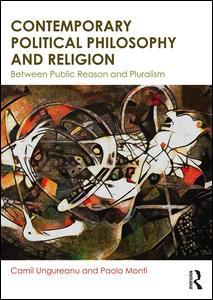Description
Contemporary Political Philosophy and Religion
Between Public Reason and Pluralism
Authors: Ungureanu Camil, Monti Paolo
Language: English
Subjects for Contemporary Political Philosophy and Religion:
Keywords
Comprehensive Doctrines; Paolo Monti; Good Life; Public Reason; Public Political Forum; Public Justifications; Religious Citizens; Reasonable Comprehensive Doctrines; Secular Reasons; Overlapping Consensus; Flying Spaghetti Monster; Otto Preminger Institut; Public Engagement; Translation Proviso; Formal Public Sphere; Young Man; Weak Thought; Exclusive Humanism; Postsecular Society; Informal Public Sphere; Strong Multiculturalism; UK Court; De Roover; Civil Religion; Audi’s View; Capability Approach
Approximative price 45.15 €
In Print (Delivery period: 14 days).
Add to cartPublication date: 12-2017
· 17.4x24.6 cm · Paperback
Publication date: 12-2017
· 17.4x24.6 cm · Hardback
Description
/li>Contents
/li>Readership
/li>Biography
/li>
What is the place of religion in a pluralist democracy? The continuous presence of religion in the public sphere has raised anew normative and practical issues related to the role of religion in a democratic polity, generating spirited political debates in Western and non-Western contexts. Contemporary Political Philosophy and Religion provides an advanced introduction to, and a critical appraisal of, the major schools of political thought with a focus on the relationship between democracy and religion. Key features of this book include:
- Analyses of different political traditions: liberalism, republicanism, deliberative democracy, feminism, postmodernism, multiculturalism, and interculturalism;
- Critical discussions of key contemporary philosophers, such as John Rawls, Jürgen Habermas, Richard Rorty, Charles Taylor, Susan Moller Okin, Martha Nussbaum, Will Kymlicka, Chandran Kukathas, and Bhiku Parekh;
- A pluralist approach that questions the strict divide between analytical and continental political philosophy;
- Discussion on the place of religion in politics from multiple perspectives by drawing on a plurality of political contexts, both Western and non-Western;
- Analyses of legal and political cases related to different religious traditions, for example, Islam, Confucianism, Buddhism, Christianity, and Hinduism.
This comprehensive text will be of great use to students of religion and politics in the fields of political and legal theory, and religious and theological studies, while also offering critical insights and arguments that will be of interest to the experts in the field.
Introduction: A Plea for Complexity 1. Political Liberalism, Public Reason, and Religion: John Rawls 2. Public Reason Contested: Religion, Citizenship, and Inclusion 3. Postsecularism, Translation, and Religion: Jürgen Habermas 4. Republicanism: Between Non-domination, the Common Good, and Civil Religion 5. Charles Taylor’s Hermeneutics of Modernity: Secularization, Recognition, and Inclusive Liberalism 6. Multiculturalism and its Critics: From Rise to Fall? 7. The Conundrum of Gender Equality and Religion: Between the Autonomy and the Capability Approach 8. Democracy and Postmodernism: Richard Rorty and Gianni Vattimo 9. Globalization and the Ambivalence of Religion
Camil Ungureanu is Associate Professor of Political Philosophy and Coordinator of the MA in Political Philosophy at the Universitat Pompeu Fabra, Spain. He has published articles in several journals and co-edited various books on the topics of contemporary political philosophy, art, religion, and politics.
Paolo Monti is Lecturer at Università Cattolica del Sacro Cuore in Milan, Italy. He has published and edited several works on the philosophy of social practices, the ethics of democratic citizenship, and the role of religion in the public sphere.




